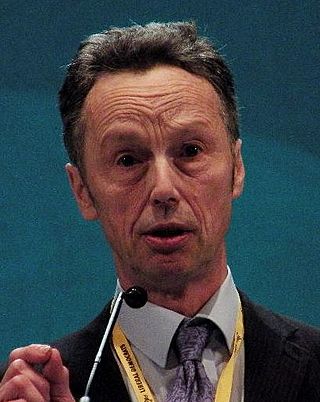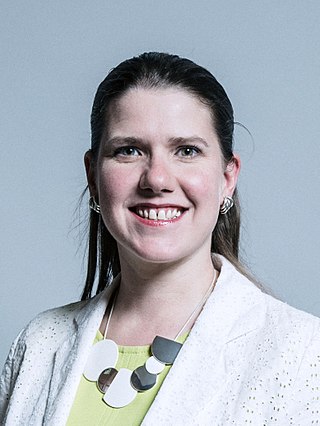
Sir Simon Henry Ward Hughes is a British former politician. He is now the Chancellor of London South Bank University, and a strategic adviser to Talgo, a Spanish manufacturer of trains. Hughes was deputy leader of the Liberal Democrats from 2010 to 2014, and from 2013 until 2015 was Minister of State at the Ministry of Justice. He was the Member of Parliament (MP) for the constituency of Bermondsey and Old Southwark from 1983 until 2015. He declined a position in the House of Lords in 2015.

Sir John Vincent Cable is a British politician who was Leader of the Liberal Democrats from 2017 to 2019. He was Member of Parliament (MP) for Twickenham from 1997 to 2015 and from 2017 to 2019. He also served in the Cabinet as Secretary of State for Business, Innovation and Skills from 2010 to 2015.

Sir Norman Peter Lamb is a British politician and solicitor. He was the Liberal Democrat Member of Parliament (MP) for North Norfolk from 2001 to 2019, and was the chair of the Science and Technology Select Committee from 2017 to 2019.

John David Pugh is a British Liberal Democrat politician. He was the Member of Parliament for Southport from 2001 to 2017. He stood down at the 2017 snap election. In November 2017, he was elected to Sefton Metropolitan Borough Council as a councillor for Duke's Ward.

Susan Veronica Kramer, Baroness Kramer PC is a British politician and life peer who served as Member of Parliament (MP) for Richmond Park from 2005 to 2010. A member of the Liberal Democrats, she was their Treasury Spokesperson from 2015 to 2017 and 2017 to 2019.

Joanne Kate Swinson is a former British politician who was Leader of the Liberal Democrats from July to December 2019. She was the first woman and the youngest person to hold the position, as well as the shortest-serving holder of the post. Swinson was the first leader of the Liberal Democrats to be defeated in their own constituency. Swinson was Member of Parliament (MP) for East Dunbartonshire from 2005 to 2015 and 2017 to 2019. In September 2020, Swinson became Director of Partners for a New Economy (P4NE).

Timothy James Farron is a British politician who served as Leader of the Liberal Democrats from 2015 to 2017. He has been the Member of Parliament (MP) for Westmorland and Lonsdale since 2005 and is the Liberal Democrat spokesperson for Environment, Food and Rural Affairs. Before entering politics, he worked in higher education.
The Beveridge Group is a centre-left group within the Liberal Democrat party in the UK. It was set up in 2001 by MPs Alistair Carmichael, Paul Holmes, John Barrett and John Pugh to promote debate within the party regarding public service provision.
In the 2006 Liberal Democrats leadership election, Sir Menzies Campbell was elected to succeed Charles Kennedy as Leader of the Liberal Democrats, the third-largest political party in the United Kingdom.
This timeline of events in the Liberal Democrats leadership election, 2006 lists the events covering the period from Charles Kennedy's initial call for a leadership election with the Liberal Democrats to the conclusion of the 2006 Liberal Democrats leadership election.
The 2007 Liberal Democrats leadership election was held following the resignation of Sir Menzies Campbell as leader on 15 October 2007, after 19 months as leader of the Liberal Democrats, the third-largest political party in the United Kingdom. Vince Cable, the deputy leader of the parliamentary party, was acting leader until the conclusion of the leadership election. The result was announced on 18 December 2007 with Nick Clegg winning by a narrow margin of 1.2%.

The Liberal Democrats are a liberal political party in the United Kingdom, founded in 1988. The current leader of the party is Ed Davey. They are the third-largest party in the United Kingdom, with 72 members of Parliament (MPs) in the House of Commons. They have 78 members of the House of Lords, four members of the Scottish Parliament, one member in the Welsh Senedd, and more than 3,000 local council seats. The party holds a twice-per-year Liberal Democrat Conference, at which party policy is formulated. In contrast to its main opponents' rules, the Liberal Democrats grant all members attending the conference the right to speak in debates and vote on party policy, under a one member, one vote system. The party also allows its members to vote online for its policies and in the election of a new leader.
The National Union of Students (NUS) "Vote for Students" pledge is a pledge in the UK to vote against tuition fee increases that was signed by over 1,000 candidates standing in the general election in 2010, notably including a large number of Labour Party MPs, who had introduced the fees in 1998 and all 57 subsequently elected Liberal Democrat MPs.
The 2014 Liberal Democrats deputy leadership election began on 18 December 2013, when the incumbent Deputy Leader of the Liberal Democrats, Simon Hughes, was appointed Minister of State at the Ministry of Justice, and opted to resign his party position to focus on his new post.
The 2015 Liberal Democrats leadership election was held on 16 July 2015 following the resignation of Nick Clegg as leader on 8 May 2015, after almost eight years as leader of the Liberal Democrats, following the party's poor performance at the 2015 general election.
The 2017 Liberal Democrats deputy leadership election was announced on 14 June 2017, and Jo Swinson was elected unopposed on 20 June.

In British politics, a Lib–Con pact is a working arrangement between the Liberal Party and the Conservatives.
The 2017 Liberal Democrats leadership election was held following the resignation of Tim Farron as leader on 14 June 2017, after just under two years as leader of the Liberal Democrats. At the close of applications on 20 July 2017, Vince Cable was the only nominated candidate and was therefore declared the new leader of the party.
The 2019 Liberal Democrats leadership election was held following the announcement of the resignation of Vince Cable as leader on 24 May 2019, after just under two years as leader of the Liberal Democrats in the United Kingdom. The two candidates to succeed Cable were Ed Davey and Jo Swinson.
The 2020 Liberal Democrats leadership election was held in August 2020, after Jo Swinson, the previous leader of the Liberal Democrats, lost her seat in the 2019 general election. It was initially set to be held in July 2020, but due to the COVID-19 pandemic it was delayed by six weeks, having been at first postponed until May 2021.










